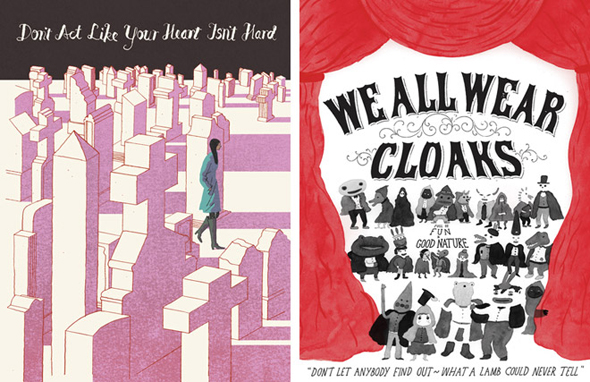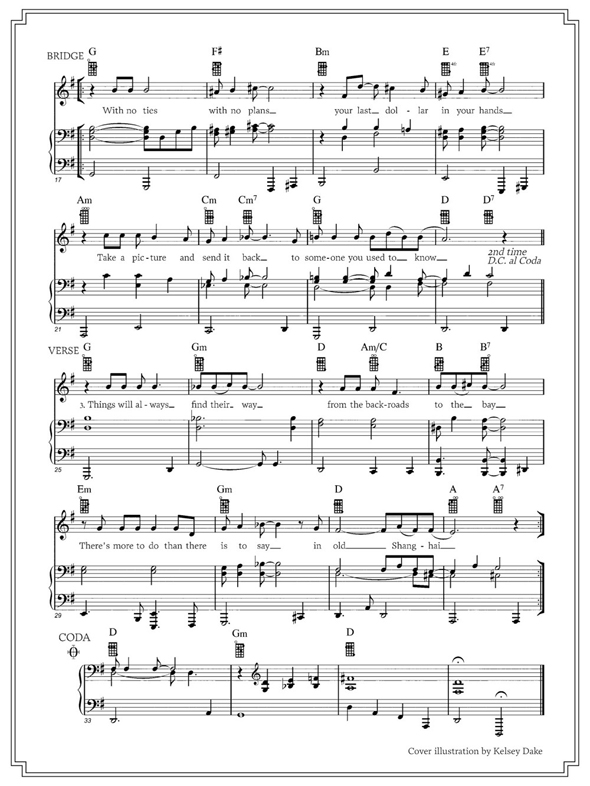Beck is releasing his new ‘album’, Song Reader, as sheet music.
As far as I can tell – I haven’t seen it but obviously that’s not going to stop me opining about it - the collection of song sheets will be beautifully designed, printed and packaged in perfect faux-antique/just-a-hint-of-a-wink-to-modernity style; a lovely, well-crafted object that will delight and amuse.

I’m ambivalent about this: viewing the world through sepia-tinted glasses isn’t my cup of Darjeeling and Beck’s choice of aesthetic only lends credence to those who think that the whole enterprise is horribly elitist/twee/smug/precious/backwards-looking and is more about gimmickry than experimentation.
It won’t help that it’s co-published by McSweeney's, the US literary quarterly/publishing company run by the writer Dave Eggers, Beck’s collaborator in this project. There’s a good case to be made that Eggers’ enthusiastic cottage industry of a magazine was the spark that set off the whole art-as-artefact, tweedgeek, retro-worship some years back; all that lauding of craftsmanship, quality, limited editions... none of which are bad things per se, obviously, but what it's led to isn't all good either, politically or aesthetically. Enough of fixed-gear bikes and wicker baskets: where did the future go? Is everyone settling for the pretence of a nebulous golden age rather than fighting to make a badly-needed new future? How does the fetishisation of marketable product - the limited print runs, the limited access – fit in a world of financially valueless, infinitely shareable digital files? Where’s the liberation, where’s the progress, where’s the shine? (Plus, isn’t this precisely one of those things white folk just love to do and write about as if nothing much else existed outside our bubble of cosy joy?)
Oh, who am I kidding?! I’d love to get my hands on a copy of Song Reader; I’ll get over my privileged discomfort. Sod reverse snobbery: mmm, pretty packaging!
According to a recent interview with The Guardian this was a seriously long-term project for Beck; he started thinking about it before the internet age, before MP3 were zipping across the globe, before the music industry as we know it juddered on its foundations with the realisation that the window of opportunity for making money from music by selling it on vinyl or plastic had begun and ended within the space of a century and a half. That particular paradigmatical ship had sunk. Of course, before then music could be sold on paper: back when every aspirational household had a piano to play rather than a radio or a record player if you wanted music, you played it yourself. And before the words cheap and mass-produced were pejoratives, intricately printed song sheets just like the Beck’s used to sell in their hundreds of thousands. Beautiful things don’t need to be small scale.
(There’s no point even trying to measure the relative moral, cultural or even goddamn psychological worth of the way music was consumed then and now; writing it, playing it, dancing to it, sharing it; concert-going or mix-tape-making or streaming or 7-inch shopping or humming it on yer paper-round: different ways and means of playing with music have their virtues and drawbacks. People were huffing and puffing just as much about the awfulness and moral turpitude of the gramophone - how it would kill music and ruin families - when it was first manufactured for home use, just as they did about home-taping not so long ago and do now about file-sharing… Change is inevitable but it certainly rattles cages, usually with solid financial reason.)

“Personalizing and even ignoring the arrangements is encouraged. Don’t feel beholden to what’s notated. Use any instrument you want to. Change the chords; rephrase the melodies. Keep only the lyrics, if desired. Play it fast or slow, swung or straight. Take a song and make it an instrumental or an a cappella. Play it for friends, or only for yourself. These arrangements are starting-off points; they don’t originate from any definitive recording or performance.” (Beck Hansen, Song Reader)
What Beck’s doing is lifting an old model and plonking it down in the 21st Century and seeing what happens, a kind of Borgesian experiment of form and consequence. What will it do to the songs? To the audience? To the industry? To the dissemination of the music? What is a song if it doesn’t appear as a finished package, with everything already in place? Who does it belong to?
If you publish a song as a blueprint, you can’t rely on tone, noise, interpretation, musicianship, arrangements, voice or presence to make it what it is; it has to be incredibly well-wrought, fit to survive the most execrable rendition. As Beck said in The Guardian, it “was a very disciplined process… It was like putting an X-ray or a magnifying glass on your own songwriting – it's right there, its weaknesses glaring”. You might be able to get a genius recording out of just feedback and howls but writing sheet music is a different art altogether.
Beck's contrariness is pretty appealing; whether it's enough to counter the argument that Song Reader is self-indulgent and elitist and will only sell to privileged aesthete-bores and those few (outside the classical world) who still know how to read music is another story.
Well, the internet changes the game entirely. It throws out a challenge to the whole world, opens that niche market wide, and, with PDFs of the pages already circulated for free, makes it a mass-participatory, exciting, collaborative, evolving global project. It's no longer limited to those people who buy the pretty package. The songs are already being recorded, shared, listened to; videos being made and uploaded and commented on. There are concerts planned, with chamber orchestras and ukulele bands. Versions are informing other versions, changing the way the songs are heard and are interpreted in a marvellous, unpredictable feedback loop of ideas. That, to my mind, is not retrogressive, despite my reservations about the craft-snob monster McSweeney's spawned.
"I want to hear how far away they are from the original way they were written," Beck told The Guardian. "I can play them live, but I'm more interested to hear what people do with them.” Yes. Me too. I want to see dubstep versions, versions played on stylophones and on trumpets; I want kids to have a go, Mongolian throat singers and cellists and pop divas. Never mind the staff of the New Yorker playing 'Old Shanghai' surprisingly well, I want to hear Beck songs played by elephants and by wind sculptures and London taxi cabs. Make it so!
I think he’s done something beautiful. Generous. Trusting. Democratic. Humble (this is no way to make a fortune). I admire the fact he's letting his songs go out into the world and his remarkable lack of control-freakery: if he ever records those songs the resulting recordings will just be cover versions among cover versions. It’s exciting to imagine what the world will make of them when it gets its hands on them; I know the results will be peculiar and wonderful and silly and magnificent and unexpected and all kinds of extraordinary, because that’s what happens when artists (Björk, Amanda Palmer among plenty of others) do this kind of thing. Never mind how good his songs actually are: it’s in the nature of cover versions that whatever the raw material, something amazing can be created.
And I know, absolutely know, that a blossoming of creativity will be the inevitable result of setting those sheet music seeds. It makes me feel hugely warm towards humanity. Because when they aren’t fucking themselves up, shooting each other or despoiling their planet, accepting dares and making music together are some of the very best things that humans beings do.
Nice one, Beck.

I'm going to leave the last word to musician Chris Anderson, who had this to say in answer to accusations that publishing sheet music is elitist because so few people read it anymore:
"I don't get the whole attitude that regards sheet music as nostalgic, quaint, elitist etc. It is the only universal language there is and a fuck sight easier than learning so-called contemporary 'languages' like say Javascript or Python or whatever. Just because music teaching curricula often eschew simple music theory doesn't mean that trying to learn to read music is in any way backward looking. I'm rubbish at sight reading but with a little perseverance wonderful things can be achieved and like anything, the more you try the easier it becomes. Music is just a language which exceeds words. It speaks across continents, cultures, faiths and politics. It draws us all together where words chosen without care can undo these good things terribly. A badly chosen note on the other hand, if repeated may become the right note and become a Number One hit, as occurred in the main riff in Gary Numan's 'Are Friends Electric?'
By learning to read music - which involves mainly being able to subdivide four or six (not elitist really) and know your ABC - you have combined elementary mathematics with elementary literacy to create any emotion you care to, and, if you love language so much, you can just add words into the recipe and hey presto, a song. By writing it down you share it in its purest form for anyone to interpret as they wish. Innit."
You can get Song Reader from the McSweeney's store.



No comments:
Post a Comment